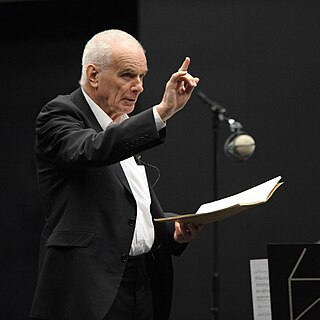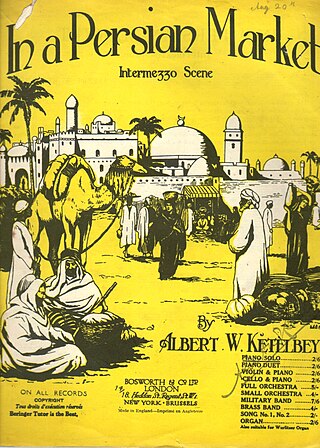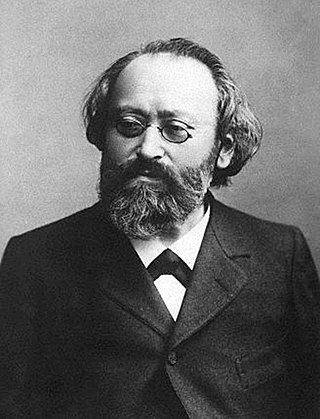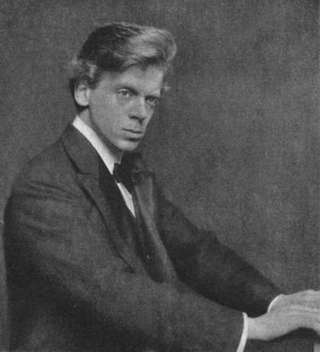
Sir Peter Maxwell Davies was an English composer and conductor, who in 2004 was made Master of the Queen's Music.
Leroy Robertson was an American composer and music educator.

Jill Crossland is an English pianist, born in Yorkshire. She studied with Ryszard Bakst at Chetham's School of Music and the Royal Northern College of Music in Manchester, and with Paul Badura-Skoda in Vienna. She has a preference for Baroque and Classical periods of the repertoire, with a focus on the music by Johann Sebastian Bach, playing it on the piano. She has performed his Well-Tempered Clavier from memory since her student years.

Sir Stephen Andrew Gill Hough is a British-born classical pianist, composer and writer. He became an Australian citizen in 2005 and thus has dual nationality.
George Tsontakis is an American composer and conductor.

In a Persian Market is a piece of light classical music for orchestra with optional chorus by Albert Ketèlbey who composed it in 1920. Subtitled Intermezzo Scene, it was published by Bosworth in 1921. It evokes exotic images of camel-drivers, jugglers, and snake-charmers. When it was first published in a version for piano, it was advertised as an "educational novelty".

Max Bruch's Violin Concerto No. 3 in D minor, Op. 58, was composed in 1891 and dedicated to the violinist/composer Joseph Joachim, who had persuaded him to expand a single movement concert piece into a full violin concerto.
Martin Roscoe is an English classical pianist. He performs as a concerto soloist, as a recitalist and as a chamber musician.

Angelo Arciglione is an Italian pianist.
Antony Pitts is an international composer, conductor, and producer.
Tonus Peregrinus is a British vocal ensemble specialising in early music and contemporary sacred music, especially that of founder and director, Antony Pitts. Established in 1990, the ensemble have recorded numerous CDs for Naxos, their first winning the Cannes Classical Award, and two albums of Antony Pitts' music for Hyperion Records – Seven Letters and Alpha and Omega. Their latest album, Music from the Eton Choirbook, was recorded using a new microphone technique developed by NRK engineer Geoff Miles.

David Owen Norris, is a British pianist, composer, academic, and broadcaster.
Jerusalem-Yerushalayim is an oratorio composed by Antony Pitts between 2006-2008, and is scored for SATB soloists, semi-chorus, full chorus, and ensemble including harp, piano, and organ. The oratorio tells the Biblical story of Jerusalem and the text is based directly on the Old Testament. Unusually, it includes Hebrew transliterations of many names and places. It was first performed in a chamber version by TONUS PEREGRINUS as part of the Opera Fringe festival in Down Cathedral, Downpatrick in Northern Ireland on 8 June 2008. The North American premiere was given by Choral Arts Cleveland, conducted by Martin Kessler in May 2012.

Kenneth Leighton was a British composer and pianist. His compositions include church and choral music, pieces for piano, organ, cello, oboe and other instruments, chamber music, concertos, symphonies, and an opera. He had various academic appointments in the Universities of Leeds, Oxford and, primarily, Edinburgh.

George Herbert Fryer was an English pianist, teacher and composer.

Andrey Rafailovich Kasparov is an Armenian-American pianist, composer, and professor, who holds both American and Russian citizenship.

Jules Massenet's Piano Concerto is a 1902 work for piano solo and orchestra. It is scored for a typical-sized ensemble of the time. The concerto was performed in 1903 by Louis Diémer at the Conservatoire de Paris. After the premiere, it quickly fell into obscurity and is seldom heard today.

Oksana Lutsyshyn is a recording artist, pianist, and professor.
Philip Dukes is a British classical viola soloist.
The Piano Concerto No. 8 in A-flat major, Op. 151 "Gruss an den Rhein", by Ferdinand Ries was composed around 1826 and published in 1829 by Simrock. While still showing the structural influence of Beethoven's piano concertos, the writing for the piano is more akin to that of later composers such as Chopin, Mendelssohn & Schumann.